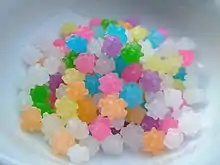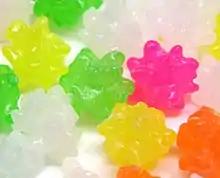Konpeitō
Konpeitō (金平糖, こんぺいとう), also spelled kompeitō, is a type of Japanese sugar candy. It takes the form of a small sphere with a bumpy surface, and comes in a variety of colors and flavors.[1]
 Konpeitō in various colors | |
| Type | Confectionery |
|---|---|
| Place of origin | Japan |
| Main ingredients | Sugar, water |
Etymology
The word konpeitō comes from the Portuguese word confeito ("comfit"), which is a type of sugar candy.[2]
The characters 金平糖 (lit. "golden flat sugar") are ateji selected mostly for their phonetic value and can also be written 金米糖 or 金餅糖.
History
The technique for producing sugar candy was introduced to Japan in the early 16th century by Portuguese traders. The infrastructure and refining technology of sugar had not yet been established in Japan. As konpeitō uses a lot of sugar, it was very rare and expensive as a result. In 1569, Luís Fróis, a Portuguese missionary, presented a glass flask of konpeitō to Oda Nobunaga in order to obtain the permit for mission work of Christianity.[3][4]
By the Meiji period, konpeitō had already been culturally prescribed as one of the standards of Japanese sweets—the character Sugar Plum Fairy in The Nutcracker was translated into Konpeitō no Sei (金平糖の精, "Fairy of Konpeitō").[5]
Production
Konpeitō is usually 5 to 10 mm (0.20 to 0.39 in) in diameter and is produced by repeatedly coating a sugar syrup over a core consisting of a grain of coarse sugar. Originally, the core was a poppy seed. The process is somewhat similar to the dragée process, except the candies are produced by being ladled with sugar syrup and rotated slowly in a large heated gong-shaped tub (dora). Each grain of the core sugar grows over the course of several days with the continued rotating, heating, and application of syrup, becoming a ball covered with tiny bulges. It usually takes 7–13 days to make konpeitō and they are still crafted by artisans today.[6]
Other uses

The Japanese Ministry of Defense's Emergency Food Ration tins and the Japan Ground Self-Defense Force's Combat Ration tins both contain konpeito candies, in addition to hard tack bread/biscuits and other food items. While the candies aid in the calorie content necessary for activities, it also helps promote the creation of saliva to make it easier to eat the dry bread. According to the Ministry of Defense's specifications, "Each white emergency ration bag will contain 150g of small dry bread, with 8 whites, 3 reds, 2 yellows, 2 greens as standard, amounting to 15g or more to be put in the bag.” It is thought that providing the 'colorful and enjoyable' Konpeito will also reduce the stress that would be experienced at times during a disaster.[7]
Konpeito is often used for celebrations such as marriage and childbirth, in elaborate candy boxes called bonbonniere (ボンボニエール), from the French bonbonnière, meaning candy box.[8] It is given as a gift for prayers at shrines and temples. The practice of giving bonbonniere dates back to the commemoration ceremony of the Meiji Constitution in 1889 and has since been thought to be a symbol of good luck. The Japanese Imperial Family has used these Onshino Konpeitō as the official ‘Welcome’ gift continuously for over 130 years.[9][10][11]
In popular culture
The Star Bits collectibles in Super Mario Galaxy, its sequel Super Mario Galaxy 2,[12] the Gratitude Crystals and Star Fragments in The Legend of Zelda series, the Star Fragments in Animal Crossing[13] as well as Minior, Max Revives (and to a lesser extent, Revives), Cosmog's star candies from the Pokémon series, and EXP Star Jellies in Cookie Run: Kingdom are all based on these candies. The susuwatari from Studio Ghibli films such as Spirited Away are also shown to eat konpeitō. Super Mario RPG also features it as an attack item that was localized as "Rock Candy".[14] The candies are a prominent icon in the anime series Stellvia, and are also featured in an episode of the children's anime Hamtaro, referred to as "diamonds of sugar" in the English dub. Similar crystals also feature in the 2023 Nintendo Switch game Pikmin 4.[15]
References
- Richard Hosking A Dictionary of Japanese Food 1996 Page 84 " Konpeitō コンペイトー 金平糖 comfit. A sugar candy introduced by the Portuguese in the sixteenth century, one kind of higashi. It is a small toffee sphere (5 mm in diameter) with a pimply surface, made from sugar, water, and flour in a variety of colors. Originally there was a sesame seed in the middle, later a poppy seed, but nowadays no seed at all. The word comfit derives from the Portuguese confeito."
- Constantine Vaporis (2012). Voices of Early Modern Japan: Contemporary Accounts of Daily Life. p. 99.
Even though the Portuguese were expelled from Japan in 1639, pan (bread), konpeito (a type of candy), tempura
- Shozo Ishizaka; Y. Kato; R. Takaki (1987). Science on form: proceedings of the First International Symposium (PDF). p. 4. Archived from the original (PDF) on 2016-03-04. Retrieved 2017-02-05.
This candy was brought to Japan for the first time by a Portuguese missionary, Luis Frois, in 1569. It was among some presents to Nobunaga, the ruler of Japan of that time. The sugar candy was kept in a bottle of glass, and was called "confeitos" in Portuguese.
- Dorothy Blair (1973). A history of glass in Japan. Corning Museum of Glass. p. 159.
The Jesuit Father Luis Frois is said to have presented to Oda Nobunaga candles and a glass flask filled with kompeito (a kind of sugar candy); and to Ashikaga Yoshiaki, silk and a glass vessel with a broken handle.
- "..まずは、チャイコフスキーの「くるみ割り人形」から「金平糖の精の踊り」。", Shūkan Asahi, vol. 106, p. 125, 2001
- 金平糖の作り方, Ebisudo-Seika
- (PDF) https://www.mod.go.jp/j/procurement/chotatsu/nds/pdf/n/n5002.pdf.
{{cite web}}: Missing or empty|title=(help) - Felice Fischer (2008). The art of Japanese craft: 1875 to the present. Philadelphia Museum of Art. p. 60.
Tokyo: Kunaicho, 2004. Yorokobi no kobako: bonbonieru no ishobi (Celebratory miniature boxes: the decorative beauty of the bonboniere).
- https://www.asahi.com/articles/ASK8855PFK88UTIL02B.html.
{{cite web}}: Missing or empty|title=(help) - "幸せを贈る"ボンボニエール"とは? 皇室ゆかりの菓子器として、引き出物やお祝いに人気".
- https://www.alic.go.jp/joho-s/joho07_001678.htm.
{{cite web}}: Missing or empty|title=(help) - https://www.thegamer.com/super-mario-galaxy-things-you-had-no-idea-about/ Super Mario Galaxy: 20 Crazy Things You Had No Idea About
- The Real Japanese Culture Behind 10 Animal Crossing References
- Super Mario Wiki: Rock Candy
- "Glow Pikmin". Pikipedia. 2023-10-02. Retrieved 2023-10-06.